Search Images
Browse Content (p. 1137)
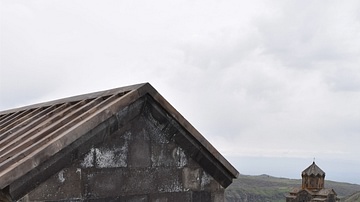
Image
Ruined Bathhouse and Vahramashen Church
Near Amberd Fortress are the ruins of bathhouses, which were popular among Armenia's elite in the Middle Ages. This bath, which is located near Vahramashen Church, was likely built in the 10th-11th centuries CE. Like other baths in medieval...
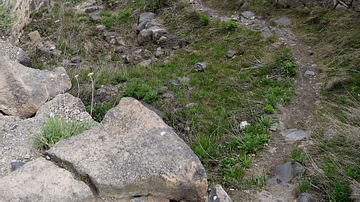
Image
Defense Walls of Amberd Fortress
Although the architecture of Amberd Fortress in what is present-day Armenia looks simple, its medieval walls were constructed from massive basalt tiles, which protected the fortress invasions and sieges. Some walls remain as thick as 4 m...
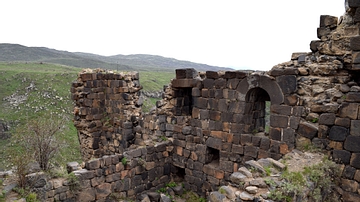
Image
Walls and Ruins of Amberd Fortress
Amberd Fortress, in the Aragatsotn province of Armenia, has a long and rich history. Its name translates as "fortress in the clouds" in Armenian, and it sits along the slopes of Mount Aragats at an altitude of 2300 m (7546 ft). Its strategic...
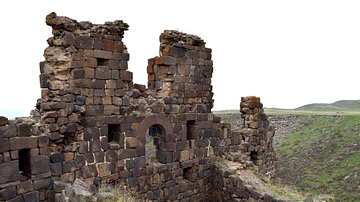
Image
Ruins of Amberd Fortress
Amberd Fortress, in the Aragatsotn province of Armenia, has a long and rich history. Its name translates as "fortress in the clouds" in Armenian, and it sits along the slopes of Mount Aragats at an altitude of 2300 m (7546 ft). Its strategic...
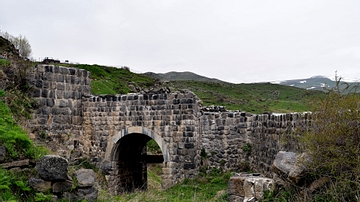
Image
Walls of Amberd and Slopes of Mt Aragats
Although the architecture of Amberd Fortress in what is present-day Armenia looks simple, its medieval walls were constructed from massive basalt tiles, which protected the fortress invasions and sieges. Some walls remain as thick as 4 m...
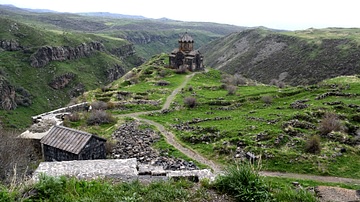
Image
View of Vahramashen Church and Ruined Bathhouses
This photo shows a view of the 11th-century CE Vahramashen Church and ruined 13th-century CE bathhouses from atop the 7th-century CE Amberd Fortress. These structures are located above the conjunction of the gorges from the Amberd and Arkashen...
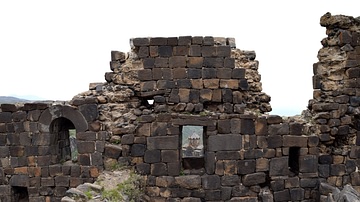
Image
Vahramashen Church Framed by Amberd Ruins
In this picture, one sees the 11th-century CE Vahramashen Church framed by the ruins of the Amberd Fortress, which was first constructed in the 7th century CE. Both structures are typical of medieval Armenian architecture, and they lie at...
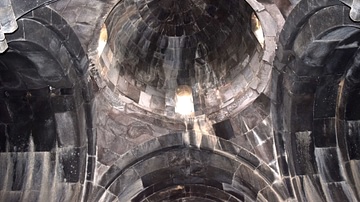
Image
Interior Dome of Vahramashen Church
The Vahramashen Church, which is located near the Amberd Fortress in what is present-day Armenia, dates from 1026 CE. This photo shows the interior of the church's conical umbrella type dome and four arches.
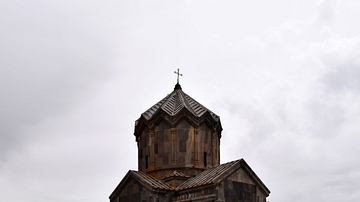
Image
Vahramashen Church in Armenia
The Vahramashen Church, which is located near the Amberd Fortress in what is present-day Armenia, dates from 1026 CE. This church was originally built for Prince Vahram Pahlavuni whose family clashed with the royal Bagratuni dynasty for power...

Image
Ruins of Amberd Fortress and Vahramashen Church
Located along the slopes of Mount Aragats in Armenia's Aragatsotn province are the ruins of 7th-century CE Amberd Fortress, the 11th-century CE Vahramashen Church, and the ruins of a 13th-century CE bathhouse and cistern stand.